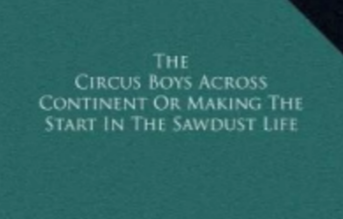CHAPTER XXII ‑The Circus Boys Across the Continent
byCHAPTER XXII — The Circus Boys Across the Continent opens amid the unsettling aftermath of a train car derailment. Phil and Teddy, despite the chaos of the incident, manage to survive with only minor wounds—Phil with a burn on his arm and Teddy sporting what he jokingly calls a free haircut. Though bruised and bandaged, the two maintain their humor, turning pain into playful banter as they brush off their injuries before rejoining the circus staff. For them, the dangers of the road are just part of the journey, another challenge to overcome as part of their growing experience with the troupe.
Later that morning, the pair enters the cook tent to a warm reception. Fellow performers, clowns, animal handlers, and crew members greet them like returning champions, admiring their calm during the wreck and celebrating their survival. The mood is lightened further when Phil and Teddy are invited to share breakfast with Mr. Sparling and the circus administrators, where conversation turns serious. Phil brings up the possibility of sabotage, pointing to the tampered switch as suspicious. Mr. Sparling, who has begun to question the pattern of misfortunes befalling the show, listens with interest and nods, suggesting the incident may be a piece of a larger threat they’ve overlooked.
Mr. Sparling’s concern grows as he reflects on previous unexplained disruptions, now seeming more connected than coincidental. His belief in a possible saboteur, likely Red Larry, deepens. The police have dismissed his suspicions, but Phil’s sharp observations reopen the case in his mind. Their discussion highlights a shifting power dynamic—Phil’s thoughts are no longer dismissed as childish notions but welcomed as contributions from someone growing into a role of responsibility. Teddy, ever the comic relief, lightens the mood with an offhand joke about becoming a train inspector, earning laughter even from the usually stern-faced Mr. Sparling.
As breakfast winds down, a ridiculous argument erupts nearby between two little performers, both claiming the title of the “Smallest Man in the World.” Their escalating bickering leads to pushing and sputtering threats, quickly drawing the attention of everyone nearby. Laughter fills the air until the situation takes a turn—hot soup spills on the Fat Woman’s dress, prompting her to cry out in distress. Teddy, in a gallant but ill-fated attempt to help, rushes over and dumps a pail of ice water over her head, worsening her discomfort and adding embarrassment to injury.
What follows is a comic chain reaction: the Fat Woman wails, the soup-slicked midgets slip on the wet floor, and a rogue tub of pink lemonade is accidentally kicked by Teddy into the air, drenching several surprised bystanders. The cook tent erupts in uproar—shouting, laughing, and sputtering performers scatter as chaos unfolds. Mr. Sparling, though initially stunned, can’t suppress his amusement and chuckles along with the rest, even as he orders someone to mop the mess. Amid the calamity, Teddy stands with an empty bucket, sheepishly grinning under dripping lemonade, completely unfazed by the confusion he has caused.
This episode, though silly, reminds the entire troupe of something essential—laughter heals what fear cannot. Moments of humor hold their own value, offering a release from the mounting pressures the circus faces. In the midst of sabotage rumors and near-tragedy, the camaraderie between cast and crew keeps morale high. Even accidents, when approached with light-heartedness, become tales to retell, bonding the performers through shared absurdity and mutual affection.
The chapter closes with a deeper understanding forming between Mr. Sparling and Phil. He sees in the boy more than just talent in the ring—there’s a maturity emerging, sharpened by crisis and strengthened by empathy. Phil’s voice is heard and valued, a signal that his future in the circus may involve leadership, not just performance. Teddy, though often the comic, is also recognized as someone whose heart is in the right place, even if his timing isn’t. Together, the duo continues to shape the soul of the show—equal parts courage, mischief, and loyalty.
This chapter, while filled with dramatic turns and bursts of laughter, ultimately reinforces what makes the circus family thrive: resilience in the face of danger, quick action during crises, and humor that brings joy even after disaster. Whether it’s derailed trains or spilled lemonade, the Circus Boys handle it all with spirit and unity. And as the train rolls forward to its next destination, the story reminds readers that strength isn’t just found in moments of triumph, but also in the laughter shared afterward.

